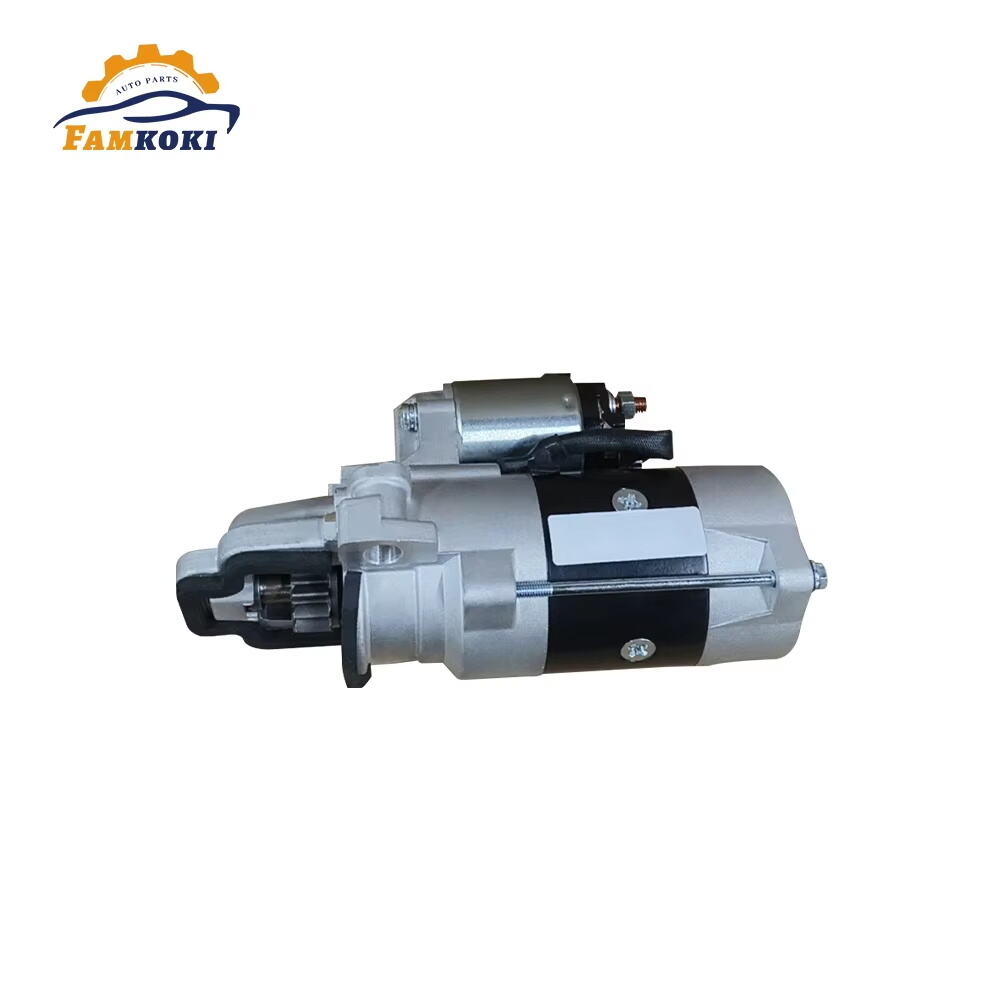Why Choosing the Right Alternator Impacts Vehicle Performance
Role of Alternators in Modern Electrical Systems
Alternators are crucial for powering various vehicle systems, such as headlights, audio systems, and onboard computers. They function by converting mechanical energy into electrical energy, which maintains battery charge and supports high-drain devices. In today's vehicles, which often have over 50 electrical components, the efficiency of an alternator is more vital than ever. Reliable alternators not only ensure the smooth functioning of electrical systems but also enhance the overall performance and safety of the vehicle.
Consequences of Insufficient Alternator Capacity
Insufficient alternator capacity can lead to noticeable power shortages, evident in dim lights, malfunctioning electronics, and difficulty starting the vehicle. Overwhelmed alternators not only shorten the lifespan of batteries and electronic components but also pose a risk of complete electrical failure. For instance, when an alternator can't meet the amperage requirements, the electrical system may falter, leading to critical failures. Thus, ensuring the alternator can handle the vehicle's electrical load is crucial to avoid these costly issues.
Assessing Your Vehicle’s Electrical Power Requirements
Calculating total electrical load (lights, audio, accessories)
Determining your vehicle's total electrical load is crucial to ensure its alternator can adequately support all components. To calculate this, add up the wattage for all electrical components such as lights, audio systems, and various accessories. Organize these into an ordered list of high-drain and low-drain items, making it easier to identify critical power requirements. For instance, lights may require 55 watts each, a car stereo could use 200 watts, and a subwoofer might need 300 watts. Use the formula: WATTS ÷ VOLTS = AMPS to convert wattage into amperage, considering that typical vehicle voltage is around 13.5 volts. By getting an accurate picture of the total electrical load, you can make informed decisions on whether a standard alternator suffices or if an upgrade is necessary.
Accounting for aftermarket upgrades and high-drain devices
Aftermarket upgrades, like performance audio systems, can significantly increase a vehicle's electrical load demands. When selecting an alternator, it's wise to add a contingency margin of at least 20% above calculated requirements. This ensures the alternator can handle unexpected spikes or new installations effectively. Accessories such as winches, lighting bars, or additional electronics must be considered, as they often require substantial electrical power. By accommodating these high-drain devices upfront, you protect your vehicle's electrical system from becoming overwhelmed, promoting longevity and reliability in its performance.
Understanding idle vs. maximum alternator output
Understanding the difference between idle and maximum alternator output can prevent electrical issues during low engine RPMs. Alternator performance varies, offering peak output only at certain RPMs, typically when driving at higher speeds. At idle, especially in modern vehicles with lower RPMs, output can significantly drop, risking voltage drops and poor electrical performance. A case study highlights that vehicles with inadequate alternator capacity often experience issues like dimming lights and sluggish audio systems when idling. This emphasizes the need for alternators designed to sustain substantial output even at low RPMs, ensuring consistent power supply across all driving conditions.
Alternator Types: OEM, High-Output, and Remanufactured
Pros and cons of OEM alternators
OEM alternators, or Original Equipment Manufacturer alternators, are known for their reliability and compatibility with your vehicle's design standards. They're tailored to meet the exact specifications outlined by car manufacturers, ensuring optimal reliability for standard usage. This makes them an excellent choice for maintaining warranty coverage and ensuring that the vehicle operates as intended. However, the specialized production process and adherence to original specifications often mean that OEM alternators come with a higher price tag compared to third-party options. This premium cost can be a downside, as it may lead vehicle owners to consider more affordable alternatives, especially when budget constraints are a concern.
When to choose high-output alternators
High-output alternators are ideal for scenarios where additional power is necessary beyond what standard alternators can provide. They're particularly useful for off-road vehicles, audio enthusiasts, and cars equipped with extensive electronic systems or aftermarket accessories. These alternators are designed to sustain performance under heavy electric loads, even during demanding applications. For example, vehicles with powerful audio systems, extra lighting, or off-roading gear can benefit from the enhanced power supply offered by high-output units. By meeting these higher power requirements, high-output alternators can significantly enhance a vehicle's functionality and ensure that all components receive the energy they need to operate effectively.
Evaluating remanufactured alternator reliability
Remanufactured alternators present a cost-effective alternative to purchasing new parts, but their reliability depends heavily on the source. They are often less expensive because they utilize refurbished materials and components, yet when sourced from credible vendors, they can match the performance of new units. It is crucial to research and select reputable manufacturers to avoid low-quality parts. Indicators of reliability in remanufactured alternators include high warranty coverage and positive customer satisfaction metrics. These factors demonstrate a commitment to quality and provide peace of mind that remanufactured units can perform reliably and last for a substantial period.
Critical Specifications: Amperage, Voltage, and Compatibility
Matching Alternator Amperage to Your Vehicle's Demands
Choosing an alternator with suitable amperage is crucial for meeting your vehicle's electrical demands. Selecting an alternator that aligns with or exceeds these demands ensures the efficient operation of all electrical components, including headlights and air conditioning. According to the Automotive Dealers Association (ADA), different vehicles have distinct amperage needs. For instance, heavy-duty trucks may require alternators with higher amperage to accommodate additional accessories. Here's a quick checklist for determining the correct amperage:
- Assess the total electrical load: Consider all electrical components, including aftermarket upgrades.
- Consult your vehicle's manual: Check for manufacturer's specifications.
- Evaluate your usage pattern: Consider if frequent high-demand operations occur, such as towing or audio systems.
12V vs. 24V Systems: Voltage Compatibility Checks
Understanding voltage compatibility between 12V and 24V systems is pivotal for ensuring optimal performance. In standard applications, 12V systems are the norm, while 24V systems are common in industrial contexts. To ensure voltage compatibility, start by verifying your vehicle’s existing voltage setup to avoid complications. Here are steps to follow:
- Check your vehicle’s specifications: Use the owner’s manual or check under the hood for voltage indicators.
- Consult with a professional: In case of uncertainty, seek guidance from a certified technician.
- Prevent mismatched units: Mismatched voltage can lead to malfunctions and may void warranties.
Physical Fitment and Pulley Ratio Considerations
Ensuring the alternator fits perfectly in the designated space is crucial for smooth installation and operation. Verify the alternator's size to match the existing installation area to avoid complications. Pulley ratios are also significant in optimizing performance, as they affect the speed at which the alternator produces power. Consider these aspects when evaluating fitment:
- Measure the installation space accurately: Use precise measurements to ensure compatibility.
- Review pulley ratios: Ensure the replacement alternator’s pulley ratios align with your vehicle’s needs.
- Common fitment challenges: Solutions include utilizing adjustable brackets or consulting a mechanic for custom solutions when faced with fitment issues.
Choosing the right alternator involves understanding these specifications alongside assessing your vehicle's electrical needs, budget constraints, and specific application requirements.
Selecting Trusted Alternator Brands and Avoiding Pitfalls
Top-rated alternator manufacturers for reliability
Selecting a reliable alternator starts with choosing a manufacturer recognized for its dependability. Among the top-rated manufacturers are Bosch, Denso, and Prestolite, which are celebrated for their consistent performance and quality. These brands have gained trust by diligently maintaining industry standards, offering extensive warranties, and earning favorable consumer reviews. When evaluating these manufacturers, consider factors like certifications from bodies such as the Automotive Parts Manufacturing Association (APMA). These delineate adherence to essential quality benchmarks that assure reliability in alternator function. Exploring consumer ratings provides a practical look into the real-world performance of these alternators, making them indispensable tools for informed decision-making.
Red flags in low-quality alternators
Identifying low-quality alternators is crucial in safeguarding vehicle performance. Common traits of inferior alternators include the use of subpar materials and limited or nonexistent warranties. Poor craftsmanship is often evident in signs like irregular noise, overheating during operation, or frequent electrical failures. To avoid these pitfalls, it's recommended to conduct thorough research, focusing on specifications and reviews from credible sources. Additionally, assess the availability of customer support as an indicator of brand reliability. A well-structured guide for evaluation can prevent long-term issues and ensure the selected alternator meets the necessary standards for safe and efficient operation.
Warranty and certification benchmarks
Understanding warranty terms is essential in evaluating alternator quality. Robust warranties often indicate the manufacturer's confidence in their product and provide a safety net for consumers. Additionally, certifications from respected automotive organizations serve as indicators of quality and reliability. Look for certifications from the Automotive Parts Remanufacturers Association (APRA), which ensures that products meet industry guidelines, reflecting best practices. To ensure all purchased alternators meet these benchmarks, consumers are advised to verify the product's documentation and inquire about warranty specifics, including coverage duration and conditions. These practices can safeguard investments and affirm the reliability of the alternator in question.
FAQ
What is the main function of an alternator in a vehicle?
An alternator converts mechanical energy into electrical energy, maintaining battery charge and powering vehicle systems such as headlights and onboard computers.
Why is alternator capacity important?
Alternator capacity is crucial since insufficient capacity can lead to power shortages, affecting vehicle systems and potentially causing critical failures.
How do I calculate my vehicle's total electrical load?
To calculate the total electrical load, sum up the wattage of all components like lights and audio systems, and convert it to amperage using the formula: WATTS ÷ VOLTS = AMPS.
What should I consider when selecting an alternator?
Consider factors like amperage matching, voltage compatibility, and the alternator's physical fitment in your vehicle's installation space.
What are the top-rated alternator brands?
Bosch, Denso, and Prestolite are among the top-rated brands known for their reliability, consistent performance, and quality assurance.
 EN
EN
 AR
AR
 FR
FR
 KO
KO
 PT
PT
 RU
RU
 ES
ES


